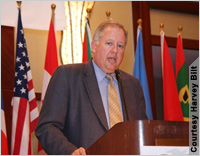DEMOCRACY AROUND THE WORLD | Giving citizens a voice
03 December 2008
New U.S. Partnership in the Americas Is Bush Legacy to Obama
State’s Shannon also discusses developments in Venezuela, Nicaragua

Miami — The Bush administration will pass on to President-elect Barack Obama and his foreign policy and national security teams a legacy of a greatly strengthened U.S. partnership with the Americas, the State Department’s Thomas Shannon tells America.gov.
Shannon, assistant secretary of state for the Western Hemisphere, said the Bush administration has created 10 free-trade agreements with the Americas, doubled U.S. foreign assistance to the region, put 100 more Peace Corps volunteers in Latin America, created an emergency plan in the Americas to fight HIV/AIDS, and forgiven more than $19 billion in debt for the region’s poorer countries.
These and other successes have created a “very strong and enduring base that will really allow the United States to enhance our relationship in the Americas,” said Shannon during an interview at the December 1-3 Miami Conference on the Caribbean and Central America.
Shannon also cited the Bush administration’s creation of the Millennium Challenge Account (MCA), “which has begun to change the way countries understand their engagement on development.” The MCA directs U.S. aid to poor countries that can show results from ruling justly, investing in people and promoting economic freedom. (See “Millennium Challenge Corporation To Step Up Review of Recipients.”)
CHALLENGES POSED BY VENEZUELA, NICARAGUA
On another matter, Shannon said he did not think Russia’s announcement in late September that it would replace the Venezuelan army’s aging military arsenal represents a threat to U.S. influence in the Americas.
“Venezuela is a sovereign nation,” said Shannon. “It has the right to build the kind of relationships it wants. Our focus is on continuing” the United States’ enduring interests in Latin America and the Caribbean.
In his December 1 keynote speech to the Miami conference, Shannon expressed great concern about the “continuing turmoil” in Nicaragua regarding accusations of fraud in that country’s November 9 municipal elections.
Nicaragua’s Electoral Supreme Council said the ruling party Sandinista Front of National Liberation won 93 of the country's 146 mayoralty positions in the elections. But the opposition Constitutionalist Liberal Party refused to accept the election results and demanded a recounting of the ballots. (See “Nicaragua Needs Vote Recount Under International Observation.”)
Shannon said the reports of fraud are “very distressing, and it’s not just distressing because of who won and who lost. It’s distressing for what it means because of the process itself and what it means” for “political conduct” in Central America. Shannon contrasted the vote fraud allegations in Nicaragua with what he said were “clean, transparent, and well-run elections” held November 30 in Honduras.
The Central American region has “committed itself to democracy” based on the “integrity of its electoral institutions” and where “people are confident” that the vote count that emerges from “electoral counting institutions are in fact the correct numbers,” he said.
All countries, including the United States, have “histories of electoral fraud,” said Shannon. But he added that in “societies that are committed to transparency, democracy and accountability, there are institutions and means to address” fraud and “this has to be done” as well in Nicaragua, he said.
“Ultimately, it’s up to each country’s citizens to defend their own vote, and the international community cannot want a vote to be fair more than the citizens of their own country,” said Shannon. Nicaraguans “have shown that they want to defend” free and fair elections and that “they want their government to be responsive to their concerns.” As an “international community we have to show that we understand and support” those concerns, said Shannon.
The Nicaraguan people’s desire to have a “clean vote count” must be made clear to Nicaragua’s Electoral Supreme Council and to the Nicaraguan government “that they might get away” with vote fraud “this time, but they won’t get away with it” in the next election, said Shannon.
“The point is not to be punitive,” or “to interfere in a political process. It is to work with countries to guarantee the sanctity” of fair elections, said Shannon.
ISSUES FACING OBAMA ADMINISTRATION
In looking to what the Obama administration will face in U.S. relations with the Americas when it takes office on January 20, 2009, Shannon highlighted immigration and migration as top issues.
The Bush administration and several leading members of the U.S. Congress tried and failed to pass comprehensive immigration reform, and “that [failure] was a terrible tragedy from my point of view,” said Shannon.
He urged the Obama team to try again to get legislation passed because it affects most nations in the region — countries receiving immigrants, countries sending immigrants and countries through which immigrants pass.
Another important issue, Shannon said, is “public security,” which he called “probably one of the biggest threats faced by our democracies and economies.” The meaning of security, he said, has expanded from fighting organized crime, drug traffickers and criminals fleeing their home countries to avoid punishment. Security also means dealing with natural disasters, environmental and ecological disasters, and pandemics, he said.
For additional information, see “Regional Cooperation Needed on Caribbean Natural Disasters.”